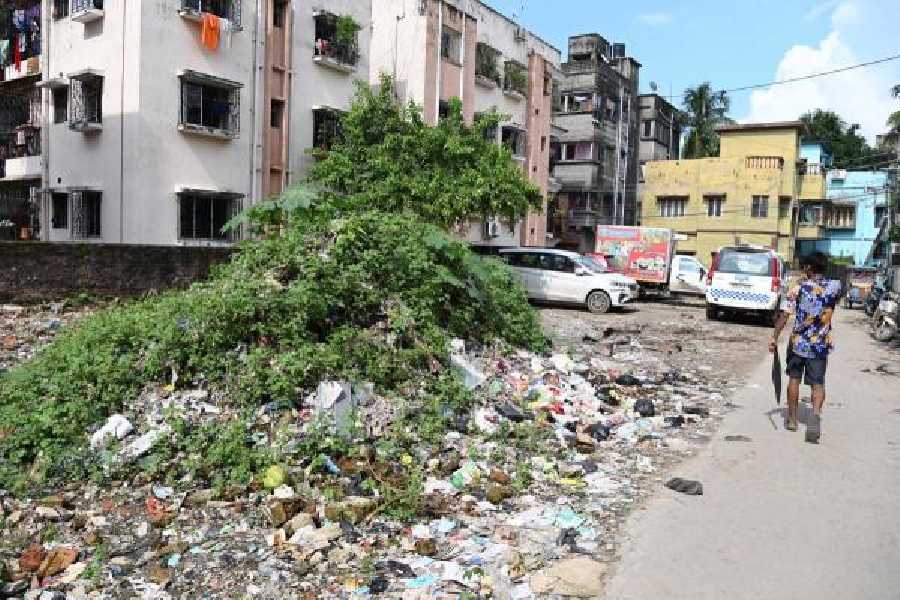Multiple sites in the city are still filled with solid waste — lying uncleaned for weeks — made largely of containers that can turn into mosquito-breeding sites if water accumulates in them.
Officials in the state health department said timely removal of such waste is the key to reducing breeding of mosquitoes and curbing the spread of dengue infections.
The dengue virus is spread by Aedes mosquitoes, which breed in stagnant freshwater. Even a spoonful of freshwater is enough for an Aedes mosquito to lay eggs.
An official said they have conveyed to the Kolkata Municipal Corporation (KMC) the need to remove waste in regular intervals to keep the dengue situation under control.
“This is the time to launch an all-out effort to destroy mosquito-breeding sites. This will yield positive results and lead to a decline in the mosquito population,” said an official in the state health department.
But the ground situation is a lot different, a tour of the city revealed.
On Sunday, The Telegraph found accumulated waste in several parts of the city. A vacant plot on Anwar Shah Road had multiple teacups and thermocol containers.
A pile of garbage was lying next to Tiljala police station. A resident said the waste has been accumulating for weeks.
In Picnic Garden, where lived an 11-year-old girl who had died of dengue a little over a week ago, accumulated waste had not been removed for weeks, residents said.
Dozens of discarded green coconut shells were found in a pile of waste along Topsia Road.
Multiple dengue deaths have been reported from the city and the rest of the state over the past few weeks. The state government and the KMC, however, are not releasing any figures on the number of people contracting the disease or dying of it.
Water accumulates in discarded teacups, shells of green coconuts, tyres and other containers after a spell of rain. “The Aedes mosquito breeds in freshwater that remains undisturbed for at least seven days. That is why it is necessary to ensure that water does not accumulate in any discarded container. A potential mosquito-breeding site should be destroyed as soon as it is spotted,” said an entomologist.
Fighting dengue effectively is possible only if all government departments coordinate and work together, a vector-control expert in Delhi said.
Cars that have gone out of use are still found lying along roads. Buses that have long been abandoned remain parked in various depots. Waste is seen accumulating on the premises of many government properties.
A state government official said around 3,000 dengue cases have been reported in Bengal since January. Most of the cases were detected in and around Kolkata.
The website of the World Health Organisation (WHO) says “the best preventive measure for areas infested with Aedes mosquito is to eliminate the mosquitoes’ egg laying sites — called source reduction.
Lowering the number of eggs, larvae and pupae will reduce the number of emerging adult mosquitoes and the transmission of the disease.”
A KMC official said there were over 8,000 vacant plots in the city. A number of them are used as garbage dumping grounds by residents of the respective localities.
“We have served notices on the owners of many such plots. If the owners are not doing their job, we are cleaning the plots ourselves
and will recover the cost
from the owners,” the official said.
The Telegraph has reported that a KMC councillor at a recent meeting at the civic body spoke about the delay in cleaning garbage-filled vacant plots.
The councillor said it took close to two months for a plot to be cleaned after a complaint was lodged.
